
Surgery and radiation chemotherapy can affect immunotherapy’s ability to target tumor cells in the nervous system, according to John Henson, MD.

Your AI-Trained Oncology Knowledge Connection!


Surgery and radiation chemotherapy can affect immunotherapy’s ability to target tumor cells in the nervous system, according to John Henson, MD.

Thinking about how to sequence additional agents following targeted therapy may be a key consideration in the future of lung cancer care.

Endobronchial ultrasound, robotic bronchoscopy, or other expensive procedures may exacerbate financial toxicity for patients seeking lung cancer care.


Patients with mediastinal lymph node involved-lung cancer may benefit from chemoimmunotherapy in the neoadjuvant setting.
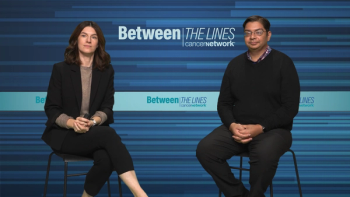
Details updated molecular analyses showing significantly fewer resistance mutations with combination therapy.

Advancements in antibody drug conjugates, bispecific therapies, and other targeted agents may hold promise in lung cancer management.

A lower percentage of patients who were released within 1 year of incarceration received guideline-concurrent care vs incarcerated patients.

Stressing the importance of prompt AE disclosure before they become severe can ensure that a patient can still undergo resection with curative intent.

Key AEs of NALIRIFOX in NAPOLI 3 were GI- and hematologic-related, with favorable rates of neutropenia and less growth factor use vs nab-paclitaxel/gemcitabine in mPDAC.

A collaboration between the Connecticut Departments of Health and Corrections and the COPPER Center aimed to improve outcomes among incarcerated patients.

Thomas Marron, MD, PhD, presented a session on clinical data that established standards of care for stage II and III lung cancer treatment at CFS 2025.

A second case illustrates clinical decision-making after progression on osimertinib, highlighting diagnostic re-biopsy and ctDNA testing.

Martin F. Dietrich, MD, PhD, explains how NALIRIFOX dosing in the NAPOLI 3 trial resulted in lower rates of grade 3/4 neutropenia vs standard therapy for metastatic PDAC.

The conversation shifts to how dual EGFR-MET inhibition reduces resistance mutations and molecular heterogeneity compared with osimertinib monotherapy.

The NAPOLI 3 trial demonstrated that NALIRIFOX improved outcomes for patients with metastatic pancreatic ductal adenocarcinoma compared with the standard of care, nab-paclitaxel and gemcitabine.
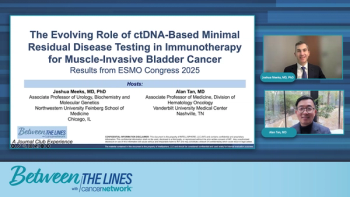
The panelists propose a nuanced view of molecular testing, suggesting ctDNA's value lies in its positive predictive capacity for identifying advanced disease, while utDNA may offer stronger negative predictive insights.

Drs. Meeks and Tan explore the SunRISe-4 trial, highlighting its innovative combination of intravesical therapy and immunotherapy.

Because EVA1 is not expressed in normal cells, there may be less toxicity when targeting it to eliminate glioblastoma-initiating cells.

Sonia Jain, PhD, stated that depatuxizumab mafodotin, ABBV-221, and ABBV-321 were the 3 most prominent ADCs in EGFR-amplified glioblastoma.
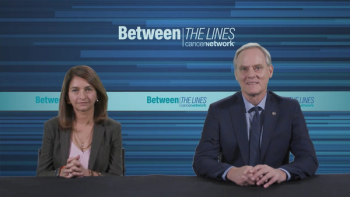
Panelists discuss how daratumumab plus KRd demonstrates manageable toxicity and strong real-world feasibility with appropriate supportive care.

Panelists discuss how ADVANCE findings support the use of quadruplet therapy in both transplant-eligible and -ineligible patients with NDMM.
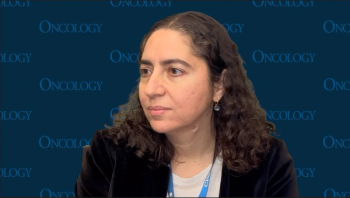
Skin toxicities are common with targeted therapies for GI malignancies but can be remedied by preventive measures and a collaboration with dermatology.
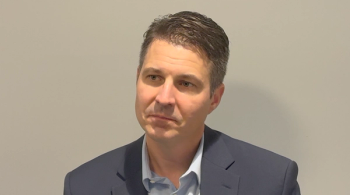
Computational models help researchers anticipate how ADCs may behave in later lines of development, while they are still in the early stages.

Presents MARIPOSA trial results showing superior progression-free survival and overall survival with amivantamab plus lazertinib.

ADC payloads with high levels of potency can sometimes lead to higher levels of toxicity, which can eliminate the therapeutic window for patients with cancer.

According to Greg Thurber, PhD, target-mediated uptake is the biggest driver of efficacy for antibody-drug conjugates as a cancer treatment.

Panelists explore the latest insights on CTDNA in muscle-invasive bladder cancer and its impact on immunotherapy decision-making and patient outcomes.

Panelists discuss new findings on adjuvant immunotherapy for high-risk bladder cancer revealing significant insights into patient outcomes and treatment strategies.

The panel reviews components of the COCOON prophylactic regimen and the safe use of temporary dose modifications to maintain adherence.